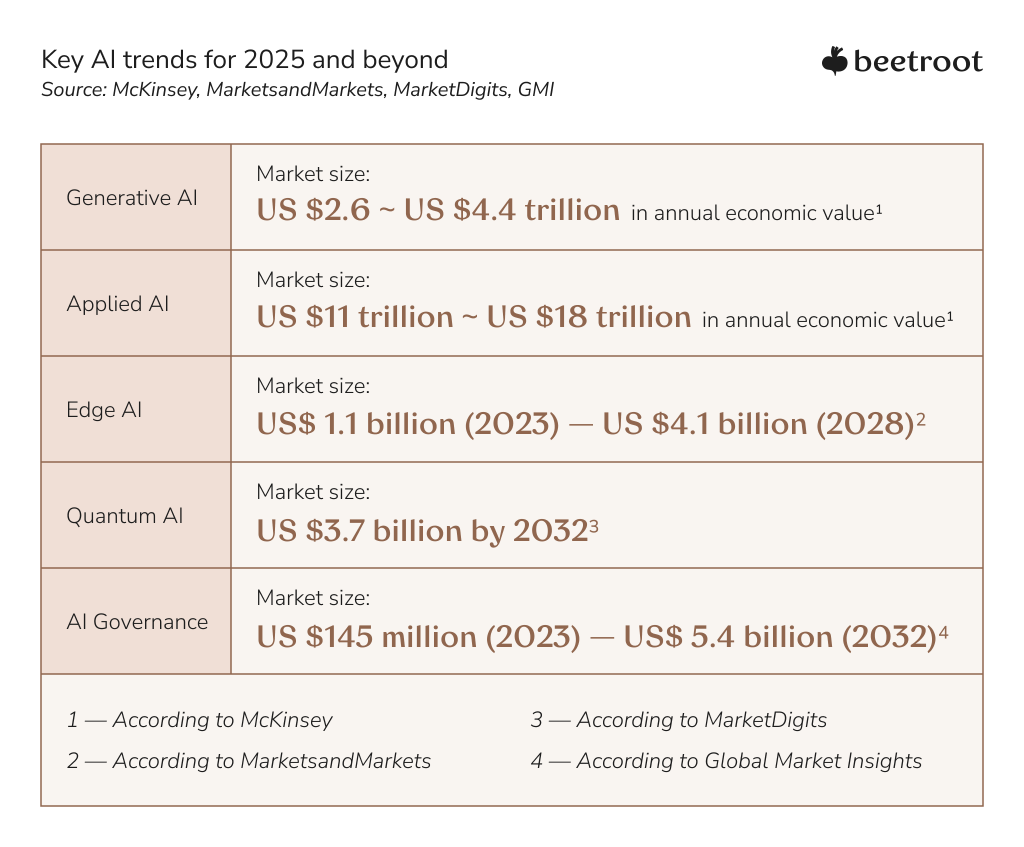
AI in GreenTech and Sustainability: Trends and Applications
Contents
Contents
Artificial intelligence (AI) is increasingly vital in enhancing sustainability efforts across many sectors, especially within the realm of green and clean technologies. By processing vast environmental data, AI is capable of identifying patterns, predicting outcomes, and suggesting interventions—from optimizing renewable energy to forecasting ecological changes. This ability to enhance and transform sustainability efforts positions AI as a crucial driver of innovation for both businesses and end consumers.
Despite challenging market conditions in 2023 and 2024, investments in frontier technologies like AI continue to rise, signaling the immense potential for widespread enterprise adoption. McKinsey’s Technology Trends Outlook highlighted Generative AI and electrification and renewables as two of the most prominent trends, reflecting strong investor confidence and growing interest across industries.
Green technology encompasses a broad spectrum of sectors, including energy, sustainable agriculture, transportation, and material science—areas where the application of AI can make a real difference. In today’s article, we will explore the significant developments and progress in AI and how they apply to driving innovation in green technology and enhancing sustainability.
Key AI trends for green technology for 2025 and beyond
Generative AI
Generative AI (Gen AI) is projected to generate between US $2.6 and US $4.4 trillion in annual value. From popular products by OpenAI, Google, Anthropic, and Meta to open-source models, Gen AI algorithms use unstructured data (such as text) as input to create new, unique content—from text and images to code, video, and simulations. In GreenTech and sustainability, Gen AI’s ability to drive innovation and improve efficiency opens up new possibilities for eco-friendly applications.
User-сentered applications
- Personalized carbon footprint visualization, allowing users to see the direct impact of their behaviors and make informed green choices;
- AI-driven insights for user engagement, tailored to promote sustainable habits and actions;
- Interactive learning modules for environmental education, using AI to create engaging, personalized content for climate awareness;
- Voice-activated green features and guidance, enabling hands-free access to sustainable lifestyle tips and eco-friendly solutions.
Efficiency enhancements
- Prototyping green features quickly with generative AI to speed up innovation cycles;
- Code optimization for energy efficiency, reducing software resource usage;
- Automating sustainability decisions to select eco-friendly options in areas like energy consumption or waste management;
- Multi-agent systems for resource optimization, where AI-powered agents coordinate to manage resources like water and energy more effectively.
While generative AI presents numerous opportunities, implementing it within GreenTech and sustainability initiatives comes with several challenges, including:
- Cybersecurity and privacy concerns, as AI systems generate and handle large volumes of sensitive data;
- Ethical considerations, including responsible use, fairness, and accountability in AI-driven decisions;
- Regulation and compliance, especially in sectors subject to environmental and sustainability laws;
- Copyright and intellectual property issues, particularly when AI-generated content resembles pre-existing works;
- Environmental impact of model training, since large-scale AI models require substantial energy resources, potentially offsetting their sustainability benefits;
- Output inaccuracies and misinformation risks exist, as AI-generated content may include incorrect or misleading information, complicating decision-making and further exacerbating bias and irrelevance.
As technology advances, addressing these challenges will allow generative AI to play a pivotal role in developing solutions for a greener future.

Applied AI
Analytical AI technologies include the applications of machine learning (ML), computer vision, and natural language processing (NLP) to solve classification, prediction, and control tasks, extend capabilities, and improve decision-making in different sectors. With the potential to generate between US $11 trillion and US $18 trillion in annual economic value (McKinsey), Applied AI plays a crucial role in advancing GreenTech and sustainability efforts. Key applications include:
Operational enhancements
- Predictive maintenance for energy systems, reducing downtime and improving efficiency by forecasting potential failures;
- Automated energy-saving actions, enabling smart systems to optimize resource use in real-time;
- Real-time environmental condition monitoring, using AI to track air, water, and soil quality for timely interventions;
- AI-powered decision-making in sustainable supply chains, optimizing logistics and resource allocation to minimize environmental impact.
Customization and compliance
- Personalized carbon footprint reduction plans, using AI to provide tailored recommendations for individuals and businesses to lower emissions;
- AI-driven simulations for climate change scenarios, enabling accurate modeling of future environmental conditions to guide policy and planning;
- Automated compliance and sustainability reporting, streamlining the process of monitoring and reporting on regulatory requirements;
- Product lifecycle simulation and sustainable material suggestions, helping companies design eco-friendly products and select materials with lower environmental impact.
While Applied AI holds great promise, its implementation in GreenTech and sustainability faces several challenges:
- Data privacy and security concerns, especially when managing large-scale environmental and operational data;
- Ensuring ethical use of AI in environmental contexts, balancing the need for innovation with responsible AI governance;
- Hardware energy consumption and environmental impact, as running complex AI models can increase energy use and offset sustainability goals;
- Integration of diverse AI technologies, which requires seamless collaboration between different AI systems and sectors;
- Accuracy and reliability of AI-driven predictions, critical for making informed decisions on sustainability initiatives;
- Scalability of AI solutions, as global sustainability challenges require solutions that can be deployed at scale while remaining effective.
Analytical AI systems represent a powerful tool for driving sustainable innovations despite current challenges and barriers. With ongoing technological improvements, ensuring scalability and ethical use will be key to unlocking Applied AI’s full potential in GreenTech.

Edge AI
Edge AI refers to algorithms processed locally on a device or “edge” of the network. The AI techniques are embedded in IoT endpoints, gateways, and edge servers to take advantage of available local computing power and process and store data close to where it is generated. By 2028, the Edge AI software market is projected to grow to US $4.1 billion from an estimated US $1.1 billion in 2023. Edge AI offers several impactful applications in GreenTech and sustainability, enabling smarter, more efficient systems. Key areas where Edge AI can make a difference include:
Infrastructure and monitoring
- Smart energy management systems for optimizing energy use and reducing waste;
- Precision agriculture to monitor crops, optimize water use, and reduce environmental impact;
- Wildlife monitoring and conservation through real-time tracking and data collection;
- Air and water quality sensors that deliver real-time environmental data to improve local response efforts.
Resource management
- Waste management and recycling systems that optimize collection routes and processing;
- Sustainable transportation systems to reduce emissions through real-time traffic and fleet management;
- Smart city infrastructure that uses Edge AI to manage resources like water, electricity, and transportation more efficiently.
Currently, despite its potential, Edge AI faces several challenges, particularly in sustainable applications:
- Limited computational power on edge devices, which restricts the complexity of AI models that can be run locally;
- The need for highly efficient AI algorithms to function within constrained computing environments;
- Battery life considerations for remote IoT devices, particularly in areas with limited access to power;
- Ensuring AI model accuracy with limited or localized training data, especially in dynamic or unpredictable environments;
- Security and privacy concerns as more data is processed locally, raising the risk of exposure to cyber threats.
Despite these challenges, the rapid growth of Edge AI presents a game-changing opportunity for sustainability. With continued advances, Edge AI is set to transform how we manage resources, making it an essential tool in the drive for environmental conservation and reducing the carbon footprint and negative impacts of human activities on the planet.
Quantum AI
Quantum AI combines the algorithms of quantum computing and artificial intelligence, leveraging quantum mechanical phenomena such as superposition and entanglement to potentially solve complex problems faster than classical computers and improve the capabilities of AI systems. By 2032, the global market value of quantum AI could reach US $3.7 billion. GreenTech and sustainability could benefit much from the junction of artificial intelligence and quantum computing. These technologies can address various challenges, such as improving resource efficiency and tackling climate change. Some potential applications include:
Optimization and forecasting
- Quantum-enhanced weather forecasting for renewable energy management;
- Optimizing waste management processes for reduced emissions;
- Quantum machine learning for more precise ecosystem modeling;
- Quantum-assisted green catalyst design for cleaner industrial processes.
Resource management and planning
- Designing more efficient photovoltaic cells using quantum simulations;
- Optimizing water distribution systems for sustainable use;
- Quantum algorithms for biodiversity conservation and species protection;
- Simulating complex environmental systems to inform policy decisions;
- Quantum-inspired urban planning for sustainable city growth;
- Optimizing carbon offset and trading programs using advanced quantum computations.
Despite the promising potential of quantum AI in GreenTech, several challenges remain before it can be widely adopted:
- Limited availability of quantum hardware;
- High costs associated with quantum computing infrastructure;
- Quantum error correction and noise mitigation;
- Lack of widespread expertise in quantum algorithms;
- Integration with existing classical systems and apps;
- Ethical considerations in powerful computational capabilities;
- Energy consumption of quantum systems themselves;
- Uncertainty in a timeline for practical, large-scale quantum advantage.
While Quantum AI shows incredible potential to transform sustainability efforts, bringing it into widespread use is more complex. Overcoming these technical and logistical hurdles to drive GreenTech forward using quantum technologies will require continued innovation, collaboration, and investment.

Responsible AI development as an ethical promise
Responsible AI entails developing and leveraging AI systems in a safe, trustworthy, and ethical way to mitigate risks and address any concerns, including accuracy, reliability, safety, privacy, fairness and bias, and sustainability while maximizing positive effects. In the GreenTech space, responsible AI is essential for ensuring technology supports ecosystems and communities rather than harming them. As tech innovators, we need to address several key concerns:
- Inaccurate or biased AI systems can lead to misallocation of resources, ineffective environmental strategies, and unintended negative impacts on ecosystems and communities;
- AI models for climate prediction, resource management, and pollution control require high accuracy and reliability;
- Privacy concerns arise when collecting individual data on energy usage and transportation habits;
- Fairness and bias issues may occur if green technologies are not equally accessible or suitable for all demographics;
- The environmental impact of AI itself (energy consumption, hardware requirements) must be considered.
AI governance
Following up on the previous point, as AI and IoT adoption increases across industries, there is an surging demand for transparent, ethical, and safe AI and IoT solutions. This focus on ethics is driving the rapid expansion of the AI governance market, which was valued at approximately US $145.5 million in 2023 and is projected to grow by more than 50% annually through 2032.
Overcoming the following challenges will be essential to fully leveraging AI’s potential to promote sustainability while upholding ethical standards:
- Data privacy: Striking a balance between gathering comprehensive data and respecting individual privacy rights;
- Algorithmic bias: Preventing AI from disproportionately affecting certain communities in environmental decision-making;
- Transparency: Making complex AI systems accessible and understandable to policymakers and the public;
- Accountability: Establishing clear lines of responsibility when AI-driven sustainability initiatives encounter failures;
- Global standards: Developing consistent ethical guidelines to be applied and complied with across countries and cultures;
- Technological divide: Ensuring that the benefits of ethical AI extend to all communities, not just those with advanced technology infrastructure;
- Long-term impacts: Considering the lasting effects of AI-driven decisions on ecosystems and future generations.
AI governance is essential to ensuring that AI solutions align with global environmental, economic, and social goals, fostering a future where technology serves the planet and humanity responsibly.
The growing role of AI regulation
AI regulation emerged as a major trend in 2024. It aims to establish comprehensive rules for AI development and use in response to growing concerns about its potential to create new and exacerbate existing inequalities. Key examples include the EU AI Act and UN Resolution A/78/L.49, US Executive Orders 14110 and 14105, the Blueprint for an AI Bill of Rights, and the AI Risk Management Framework.
These policies, both legally binding and non-binding, seek to steer AI towards greater global good and social responsibility, building systems that are reliable, fair, and aligned with human values. Notably, many of these regulations also emphasize sustainability reporting and AI’s broader environmental impact.
As AI regulations continue to evolve, they will increasingly help ensure that AI not only drives innovation but also contributes to global sustainability and social equity.
The role of sustainable tech partnerships in AI and GreenTech
Artificial intelligence has become a frequent topic of discussion. However, to assert AI truly delivers value, we, as tech leaders, must go beyond the buzz and focus on practical, responsible applications that address real-world challenges. Customers today aren’t swayed by AI hype; they are looking for real solutions to their unique business challenges. This is where the importance of sustainable tech partnerships comes into play.
At Beetroot, we believe that digital technologies have the power to play a transformative role in environmental conservation and advancing the UN Sustainable Development Goals. As a trusted partner in GreenTech software solutions, we combine domain expertise with a steadfast commitment to responsible development practices, from research and development to commercialization.
We see AI as a powerful tool for sustainable impact. Our approach to leveraging its potential is twofold: driving innovation with AI while being mindful of its ecological implications and ensuring that the technology we develop aligns with our values of sustainability and social responsibility as a tech ecosystem.
A key aspect of this commitment is continuous learning. Through Beetroot Academy, we offer specialized AI training programs that equip teams to harness AI effectively. Whether it’s GenAI training, AI for productivity, or courses for software developers, HR professionals, leaders, designers, and QA engineers, we provide the skills needed to stay ahead in the evolving tech landscape.
If you have a GreenTech project in mind, we’re ready to help you leverage AI for the greater good. Let’s collaborate and bring your vision to life.
Subscribe to blog updates
Get the best new articles in your inbox. Get the lastest content first.
Recent articles from our magazine
Contact Us
Find out how we can help extend your tech team for sustainable growth.






